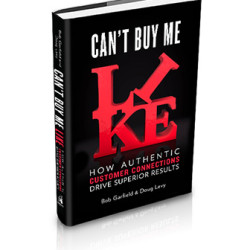The last few years have revealed a marked shift in social media from organic, conversational content back into the realm of paid advertising. Facebook ignited the trend in 2004 with its initial ad opportunities followed by Twitter and most recently, Instagram.
But wait. I thought social media was supposed to be…social?
Plagued by this quandary, I turned to “Can’t Buy Me Like,” Garfield and Levy’s exploration of social media engagement. Although published in 2013, the book provided relevant concepts that mirror and guide our own client strategies today.
Embrace the Relationship Era.
Until recently, the rules of marketing engagement fell within the Consumer Era, campaigns that operated on target marketing: determine what the public wants, provide it and craft seductive messages to win the emotions and hearts of your public. Social media, however, has ushered in a new era in which the currency isn’t messaging; it’s trust. Marketers must seek to build stronger relationships, fuel engagement and foster enduring connections.
Define your purpose.
For some, the approach requires a reboot or at least a return to a foundational principle. Why are you here? What is your core purpose? This isn’t a slogan or differentiating market trait. It’s a core statement that simply and transparently unveils the company’s reason for existence. Strip away the fluff and jargon and reconnect to the convictions that kick-started your business in the first place. Once determined, the “why” can then guide the “how” and the “what.”
I thrive from examples, so here’s one that the authors proffered by Secret deodorant:
Why: Secret exists to help women of all ages be more fearless.
How: We help women remain self-assured and confident in all social situations.
What: Secret provides superior underarm deodorant for women.
Note, the “why.” Secret’s ensuing campaigns (or “ignitions,” as they call them) all spring from the concept of building, celebrating and supporting fearlessness, evidenced by its notorious “Mean Stinks” initiative. The brand isn’t driven by selling lavender-scented deodorant. Secret is building fearlessness.
Treat people as people.
As marketers, we’re all dying to know the value of a “like.” Since we dished out cash on a Facebook ad campaign, it’s natural for our Consumer-Era-trained psyches to want to quantify the return on investment (ROI). Alas, the Relationship Era demands a fundamental shift in thinking, a departure from measuring cold transactions to embracing social media as a tenuous yet real-life relationship.
Garfield and Levy encourage businesses to approach audiences as people, gain understanding of their holistic lives and simply give them what they need to improve their entire lives. And something for your craw: research shows an inverse relationship between brandedness and willingness to share. So the more you push your brand, the less likely your audience is to share your content.
Instead, search for people with overlapping affinities. Join the conversation by sharing what real people would share, from anecdotes and personal stories to helpful tips curated by others.
Live it out.
Since trust is the currency in the Relationship Era, brands must walk the walk — live out the principles to which they espouse. Nothing smashes trust faster than a disparity between claims and actions. Notably, thin attempts at community social responsibility (CSR) or one-off community projects doesn’t count. Companies build and maintain credibility on social media by making transparent business decisions that hold true to their purposes, their “why” for existence.
Why read?
While the book doesn’t provide tactical applications, the premises offer grounding principles for companies to evaluate their social media strategies. For those new to the Relationship Era concept, the book provides a strong starting point to reframe your thinking. For those of us already embracing relationships, we can benefit from an inspiring reminder.
It’s not about “sell, sell, sell.” It’s about “engage, engage, engage.”
Want to know what else we’re reading these days? Check out Dana’s review of “Manipurated.”

